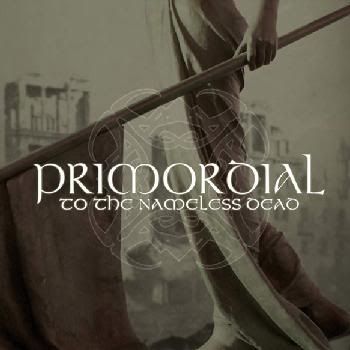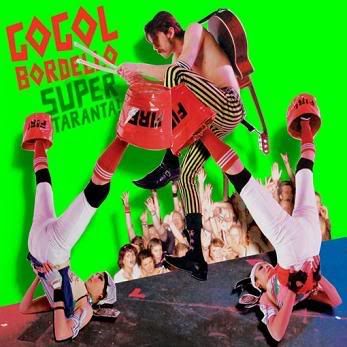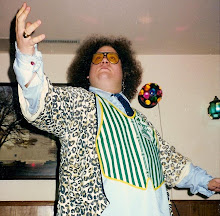2K7 in Review: My Favorite Albums, #3
Well, I ain't gonna be done looking back at 2007 before half of 2008 has passed. C'est la vie, as Robbie Nevil used to say. To answer an obvious question, yes, I have kept up with some new music, but not nearly at the pace I did last year. The time and resources just aren't there anymore. Yet the instant-info nature of the blog medium dicates that while this endeavor drags out, I must provide some fresher recommendations. Therefore, your friendly neighborhood SoulReaper recommends such 2008 releases as Equilibrium's Sagas, The Mars Volta's The Bedlam in Goliath, Man Man's Rabbit Habits, Woods of Ypres' Woods III: The Deepest Roots and Darkest Blues, They Might Be Giants' Here Come the 123s, Testament's The Formation of Damnation, Tokyo Police Club's Elephant Shell, Protest the Hero's Fortress, Dismember's Dismember, Murder By Death's Red of Tooth and Claw, Alestorm's Captain Morgan's Revenge, Foals' Antidotes and Nachtmystium's Assassins: Black Meddle Part I. Now, before I head off to Portland for my cousin's wedding tomorrow, here's another retrospective review. Have a kick-ass 4th!
 3. Primordial, To the Nameless Dead (Metal Blade)
3. Primordial, To the Nameless Dead (Metal Blade)
Let's return to this whole folk metal business, which has ballooned to the point that a band doesn't need to be from any given area to play a style influenced by that area. You've got Brazilians doing Celtic metal, Russians doing South American metal and Spaniards doing viking metal (even Ukrainians howling about Christian themes within a viking/black metal framework!), so it's clearly anything goes. One might cry foul at the lack of perceived authenticity in such a phenomenon, but that's the nature of phenomena. In metal or not, talent and ingenuity always trump "true" ethnic ties; just ask a pancultural American musician like Ry Cooder, Mickey Hart or Zach Condon. Our own melting pot has no monopoly on panculturalism, which exists in places that have more identifiable indigenous cultures. Naturally, metal is no exception, as seen in the aforementioned examples and in such globally-minded acts as Germany's SpiRitual, Belgium's Ancient Rites, Austria's Hollenthon and the subject at hand, Ireland's Primordial. The latter's craggy, combative, creative thunder is the most unique sound currently distributed by Metal Blade Records, America's longest-running heavy metal label. Having ditched the traditional folk instruments that remain a crucial component of other Celtic metal acts after album number one, the quintet maintains a strong ethnic atmosphere through the typical guitars/bass/drum setup, their combination of mood and bombast unlike anyone else's. As the album's liner notes state, the themes running through To the Nameless Dead are nationhood, what makes someone give their life for such a vague concept and what happens to their culture when a nation's borders change or disappear. Not your typical "I must fight the Christians" claptrap, but this has always been one of the pagan metal movement's most cerebral bands.
The band's previous masterpiece of ferocious melancholy, 2005's The Gathering Wilderness, squeezed torrents of outsized emotion through its quiet, muddy mix. Its follow-up sounds much clearer and louder, and in turn, even the dirges on Dead are less contemplative, more direct and assertive, at times brilliantly triumphant. Take the deceptively simple "Gallows Hymn," loping along with dejected militarism, building into a massive waltz that cracks open with intensity when the double bass drums kick in, or "Failures Burden," which begins as a fuzzily melodic downhearted rocker in the Katatonia vein but ends up rocketing along at a rousing yet spiteful clip. Opening anthem "Empire Falls" gains immediate points by backing up Ciáran MacUiliam and Michael O'Floinn's typically dark Celtic riffing with a rigid gallop that gives steel edges to the somber melody. More controlled and confident than ever, A. A. Nemtheanga bellows a crackling chorus that might serve as Primordial's statement of intent: "Where is the fighting man?/Am I he?/You would trade every truth/For hollow victories." The quintet's old black metal blast makes a welcome return on the defiant "Traitors Gate" (what do these guys have against apostrophes?), which along with the tribal pounding of "As Rome Burns" makes excellent use of Simon O'Laoghaire's ever-busy war drums. My favorite track is the very Irish-sounding "Heathen Tribes," which sincerely salutes their loyal fans across the globe in a non-Manowarian manner, topped with guitar solos that will swell any folk metal lover's heart to bursting. Primordial chooses to close with the slow, stately gait of "No Nation on This Earth," wherein Nemtheanga's croon brings home the album's theme ("Tell me what nation on this Earth/Is not born of tragedy?") with clear-eyed intensity. Leading through example, Primordial transcends the Emerald Isle's borders while retaining their identity, their less hermetic viewpoint befitting global domination.
No official videos were made for Primordial's To the Nameless Dead, but here is an "unofficial" live multicamera recording from Dublin in January.
"Empire Falls"
 3. Primordial, To the Nameless Dead (Metal Blade)
3. Primordial, To the Nameless Dead (Metal Blade)Let's return to this whole folk metal business, which has ballooned to the point that a band doesn't need to be from any given area to play a style influenced by that area. You've got Brazilians doing Celtic metal, Russians doing South American metal and Spaniards doing viking metal (even Ukrainians howling about Christian themes within a viking/black metal framework!), so it's clearly anything goes. One might cry foul at the lack of perceived authenticity in such a phenomenon, but that's the nature of phenomena. In metal or not, talent and ingenuity always trump "true" ethnic ties; just ask a pancultural American musician like Ry Cooder, Mickey Hart or Zach Condon. Our own melting pot has no monopoly on panculturalism, which exists in places that have more identifiable indigenous cultures. Naturally, metal is no exception, as seen in the aforementioned examples and in such globally-minded acts as Germany's SpiRitual, Belgium's Ancient Rites, Austria's Hollenthon and the subject at hand, Ireland's Primordial. The latter's craggy, combative, creative thunder is the most unique sound currently distributed by Metal Blade Records, America's longest-running heavy metal label. Having ditched the traditional folk instruments that remain a crucial component of other Celtic metal acts after album number one, the quintet maintains a strong ethnic atmosphere through the typical guitars/bass/drum setup, their combination of mood and bombast unlike anyone else's. As the album's liner notes state, the themes running through To the Nameless Dead are nationhood, what makes someone give their life for such a vague concept and what happens to their culture when a nation's borders change or disappear. Not your typical "I must fight the Christians" claptrap, but this has always been one of the pagan metal movement's most cerebral bands.
The band's previous masterpiece of ferocious melancholy, 2005's The Gathering Wilderness, squeezed torrents of outsized emotion through its quiet, muddy mix. Its follow-up sounds much clearer and louder, and in turn, even the dirges on Dead are less contemplative, more direct and assertive, at times brilliantly triumphant. Take the deceptively simple "Gallows Hymn," loping along with dejected militarism, building into a massive waltz that cracks open with intensity when the double bass drums kick in, or "Failures Burden," which begins as a fuzzily melodic downhearted rocker in the Katatonia vein but ends up rocketing along at a rousing yet spiteful clip. Opening anthem "Empire Falls" gains immediate points by backing up Ciáran MacUiliam and Michael O'Floinn's typically dark Celtic riffing with a rigid gallop that gives steel edges to the somber melody. More controlled and confident than ever, A. A. Nemtheanga bellows a crackling chorus that might serve as Primordial's statement of intent: "Where is the fighting man?/Am I he?/You would trade every truth/For hollow victories." The quintet's old black metal blast makes a welcome return on the defiant "Traitors Gate" (what do these guys have against apostrophes?), which along with the tribal pounding of "As Rome Burns" makes excellent use of Simon O'Laoghaire's ever-busy war drums. My favorite track is the very Irish-sounding "Heathen Tribes," which sincerely salutes their loyal fans across the globe in a non-Manowarian manner, topped with guitar solos that will swell any folk metal lover's heart to bursting. Primordial chooses to close with the slow, stately gait of "No Nation on This Earth," wherein Nemtheanga's croon brings home the album's theme ("Tell me what nation on this Earth/Is not born of tragedy?") with clear-eyed intensity. Leading through example, Primordial transcends the Emerald Isle's borders while retaining their identity, their less hermetic viewpoint befitting global domination.
No official videos were made for Primordial's To the Nameless Dead, but here is an "unofficial" live multicamera recording from Dublin in January.
"Empire Falls"




